Palais des Thés, now and in the future
François-Xavier Delmas, founder of Palais des Thés, shares stories from the company’s early days to his plans for the company’s future centered around sustainability, education and fairness.
In conversation with Bénédicte Bortoli
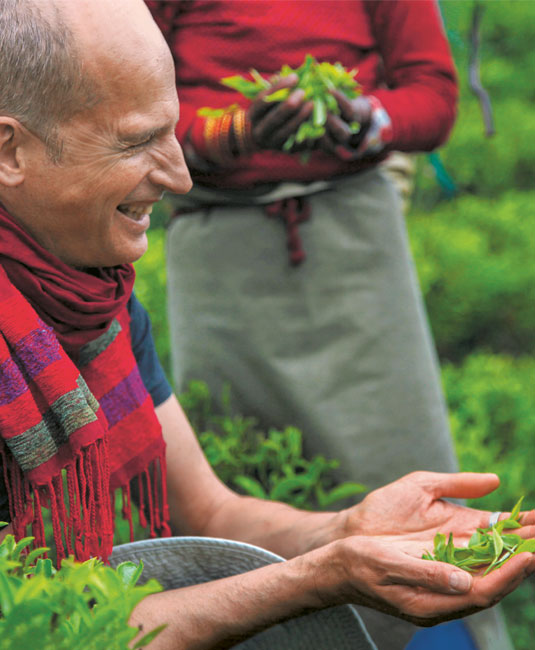
When you created the first Palais des Thés store 35 years ago, did you already have a vision? A dream?
François-Xavier Delmas: We brought together 45 tea-lovers to kickstart the Palais des Thés venture. We were driven only by our enthusiasm and a desire that our small business would still be going after three years, and that with our precarious two-year lease, it would become somewhat established. I had no specific vision, let alone a “concept” or business plan. I didn’t know what these words meant, but I’d noticed that there was nowhere dedicated entirely to tea. Tea was still associated with something else. Tea was British, colonial or herbal, there was tea and coffee… But there was nowhere you could sell tea where you could talk about tea for its own merits without being burdened by a particular outlook or cliché. To me, tea deserved a place in its own right, free from other elements that always got in the way.
How did the desire and the need to go direct to the source of tea come about?
FXD: The idea of buying tea direct from the planters without middlemen came fairly quickly, at least as soon as we were able to sell a certain volume. At first I simply searched the yellow pages for “tea importers”. It was easy, there were eight in total! We went to see them and soon realised that they weren’t proper importers. Then, in the early 1990s, I went to Japan and was shocked to discover that the Japanese teas sold in France were nothing like what I was drinking over there. From then on, we started buying directly in Japan, Taiwan and China, not to get a lower price but to have a connection with the planters. I started going to tea-producing countries more often. I made contacts, gained a little credibility and built trust.
Contrary to the middlemen who didn’t like being asked too many questions, the people who actually made the tea were very happy to talk about what they do. I immediately saw the value of having fresh tea and of knowing more about how it is made. Having received no education about tea myself, and having no culture of tea – I was told you couldn’t just start up a tea company without coming from a tea family! – I had to get the information from the source, in other words, from the farmers.
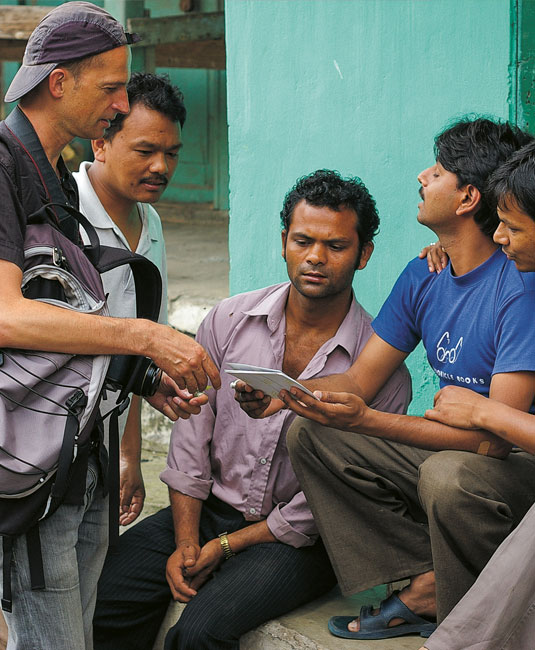
Why do you want to spread knowledge about tasting tea and how it’s made in addition to selling it?
FXD: We didn’t intend to keep this knowledge to ourselves, the knowledge we had such difficulty obtaining, and only did so by travelling and researching. The tea world maintained a sort of cult of secrecy, of knowledge reserved for experts. But sharing knowledge with as many people as possible is an immense asset. We wanted our company to be open to everyone interested in tea, near or far. It was a bit of a wake-up call.
It was up to us to become more knowledgeable so that we could educate others. So the idea of a shop, a place people could come to, was obvious. Of course, it was a real struggle to acquire a customer base, but what we were building was strong and positive and even at that stage there was a real sense of education. Palais des Thés has always fundamentally been about educating people. Our customers have grown with us in their knowledge of tea. In our own small way, we have helped make the French more knowledgeable. Our role is similar to that of a wine merchant, with the idea of guiding and sharing a passion. These days, our customers are very knowledgeable. It’s a challenge for us to live up to their expectations. In the early years, we didn’t have many customers which meant we could dedicate time to sharing our knowledge. Things changed with the opening and success of the third shop in Rue Vieille-du Temple, in the Marais district of Paris.
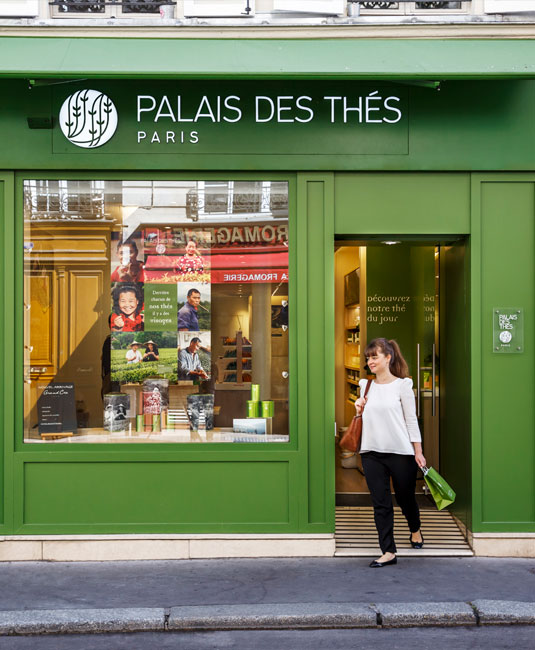
Is there a Palais des Thés style?
FXD: Palais des Thés has a close relationship with the written word. The brand writes a lot. I love writing! We are committed to leaving a legacy and are proud to have turned our passion into a profession, that of the tea sourcer, and to have contributed to the recognition of the job of the tea sommelier. We are of course a brand with its obligations, but we also like to cultivate close relations. We want to be a place where people feel good. If there is a Palais des Thés style, it is based on simplicity, hospitality and conviviality.
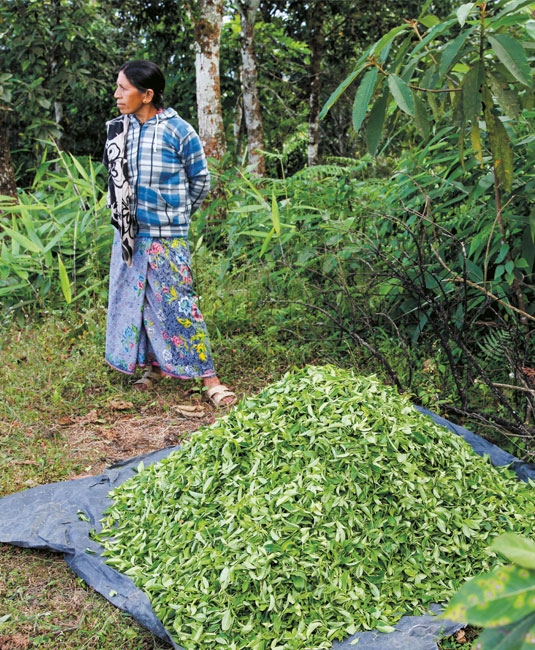
The word “loyalty” crops up often within the company. How is this central to Palais des Thés’ values?
FXD: With producers, our relationship is becoming easier and closer. Now some producers contact us directly. Today, most of them supply us on a permanent basis. Twenty years ago we couldn’t have bought Jukro, for example, and we wouldn’t have sold it. Loyalty is at the heart of our relationships. We don’t ask someone who produces 150 kg to suddenly supply 300 kg because we could sell it.
But we can guarantee them that we’ll buy several batches. We don’t influence production or volumes. In fact, the selection of rare teas we offer differs from one store to another depending on the volume. I find it exciting that store managers can choose which teas they’re going to sell and can then give you advice on them. They say, “I’d like this one myself”, and then they’re really engaged when they suggest it to customers. Like our tea sommeliers, I take them on trips as often as possible. We also try to accompany each customer as best we can in their “life of tea”, helping them to discover new things and maintaining their curiosity with new products. Some customers now ask for very rare teas. They’ll say, “If you ever get an Oriental Beauty, here’s my number, please put some aside for me.” There are fine teas just like there are fine wines!
What does “being committed” mean for Palais des Thés?
FXD: It means we’re responsible for everything we do, in terms of buying tea, hiring employees and human relations at Palais des Thés, in terms of what we do with the company’s profits within the context of sustainable growth that benefits everyone. Tea, and its birthplace in Asia, teaches us the value of time throughout a relationship. In Asia, time isn’t the same as in the West.
To create sustainable relations in Asia we need to embrace this approach to time. This didn’t necessarily come naturally to me, but over the years it has become clear that time in Asia is time for business and for tea. Tea is consumed sitting down, it takes time to prepare, and therefore requires a specific relationship with time. We wouldn’t change producers because their neighbour sells cheaper tea. Longstanding producers make up the bulk of our suppliers. It really takes a serious incident for us to end a relationship with a planter. We adopted the Asian way because we’ve travelled, we’ve met people and enjoyed our time there. The key is to go and visit the plantation and ask how it’s organised, how the planter lives, what makes them happy. You need to take an interest in them, listen to them, understand how they work, because there are many different business models in the world of tea. We engage in relations that are akin to friendship, we pay attention to others, we try not to constrain them by imposing too low a purchase price, we sleep as a guest in their home, we take an interest in the lives of the people who work in the tea fields, in whether or not there’s a school, in whether the plantation is likely to be handed down to the next generation, in the benefit or not of moving towards greater mechanisation, in the possibility of providing care if someone has an accident at work, and so on.
Our commitment to the planters is first and foremost to pay a fair price, to ensure they’re in a comfortable position, and to promote the quality of their work by all means available to us. By telling our customers about a Nepalese garden, we showcase it and give it real support. And we ask ourselves: if I pay the producer twice the price for his tea, will it have a knock-on effect on the quality of life in the village? We can only find out by going there regularly. It’s common sense, nothing more than that. We want to benefit the producer and not profit at the expense of others or the planet.
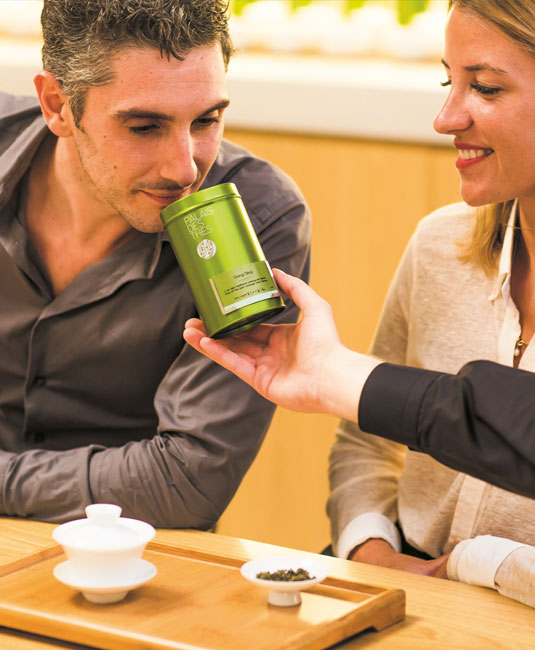
What direction is Palais des Thés taking now?
FXD: We are now entering a new phase, looking ahead, by becoming more involved with producing countries. One way we are doing this is through a partnership with an agricultural engineering college. Every year, we will send a recently graduated engineer to a plantation. Together, we will define the needs of the plantation based on the real-life situation, for example conversion to organic, problems linked to the soil or to the tea plants, research into a particular cultivar and so on. This is a collaborative project that involves Palais des Thés employees, the engineer and of course the planters, and is something that can only be carried out over the long term. Sustainability and loyalty are at the heart of all our projects, such as our commitment to organic farming methods to make more and more of our teas organic.
We also partner with associations such as Karuna-Schechen, established by Matthieu Ricard, which work on the ground to set up projects focusing mainly on education. It’s important for us to be able to rely on a local player and to remain small-scale so that we are actually useful rather than just make ourselves feel better.
We are taking action to build a virtuous model that benefits all those involved in the world of tea.
To achieve this, we make sure that we don’t harm the planet by setting goals to reduce our use of plastic and to become carbon neutral. Through a series of choices, always focused on the long term, we are constantly trying to benefit everyone who has contributed to the Palais des Thés project and to believe in them, whether they are employees, producers or customers. We are working to have a positive impact by following a growth path we can all be proud of. Our greatest reward is to spread the love of tea a little further every day and to value the people who gave it to us.
